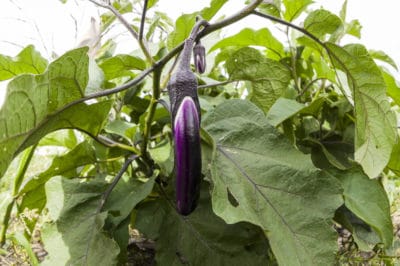Size of Japanese Eggplant
If grown under the right conditions, Japanese eggplants grow up to 4-feet tall and 3-feet wide. The plants reach full size in 50 to 60 days. They need plenty of space in the garden, so all parts of the plant get direct sunlight. Increased space also allows air circulation around the base of the plant and throughout the foliage, preventing fungus and disease. It also makes it easier to see any pests on the leaves.
Spacing of Japanese Eggplants
When planting your Japanese eggplant seedlings, make sure they’re spaced 3 to 4 feet apart. Since the full-grown plants reach 4 feet, it’s a good idea to stake them, or use tomato cages to prevent them from falling over.
Size of Japanese Eggplant Fruit
Unlike, the pear-shaped fruit of traditional eggplants, like the Black Beauty variety, Japanese eggplants grow up to 10-inches long. The fruit is slender with thin skin.
Size of Japanese Eggplant for Harvesting
Harvest your Japanese eggplants when they reach about two-thirds of their mature size for the best flavor. The ideal size to pick Japanese eggplant is when they’re young, and about the length of your finger or a hot dog. The ripe eggplants will feel sturdy and firm with a hard stem. Young Japanese eggplants have a sweet flavor, and the skin is so thin, you won’t have to peel it for your recipes.
You should pick Japanese eggplants as soon as they’re ripe, usually once or twice every week. If you have too many eggplants to use right away, you can store them at room temperature for 24 hours. They have a very short shelf life.
You can also preserve eggplant for future use by freezing them after cooking in the following ways:
- Roast
- Blanch
- Fry
- Puree
If the skin on your eggplants becomes dull or soft, then they’ve stayed on the vine too long. They’ll also be mushy and very bitter.
